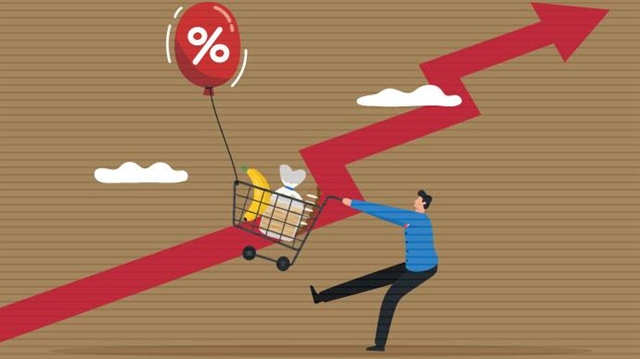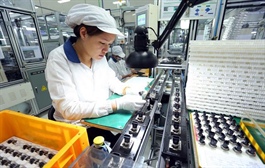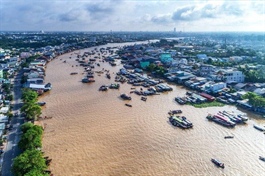Rising inflation will slow economic recovery
Rising inflation will slow economic recovery
Although global inflation is a reality, the general feeling is that inflation is still under control. However, continued rising inflation is bound to affect the efforts of the Government to make full economic recovery. Now it is to be seen which efforts and factors will be the focus in adjusting and containing rising inflation.
Illustrative photo. |
Petrol prices skyrocketing
The General Statistics Office (GSO) announced the economic data at the end of June, which showed a sharp increase in prices in the first months of the year under many complicated developments. The main factor was the increase in gasoline prices and its impact on production, businesses, services, and the general population. Up to the time of the price increase on 13 June, gasoline prices had increased 12 times and decreased three times. Gasoline prices have reached the highest level in recent years, by over VND 32,000 per liter, and diesel oil prices are also approximately around VND 30,000 per liter.
Vietnam is still quite dependent on the global finished petroleum market as domestic production only accounts for 70%, hence the price fluctuation based on global increases and decreases is inevitable. More importantly, we must consider how to implement this price increase in actual conditions from time to time, in accordance with the tolerance level of businesses and the general consumer.
We must first see the effects of this price increase on production and service businesses. When gasoline prices increase continuously, with a strong margin in a short time, it has an immediate impact on transportation costs of public and freight transport enterprises as fuel costs account for 35% to 40% of transportation costs. In the last few months, some transport units have suffered heavy losses and are considering increasing freight rates to ensure normal operations.
Now fishermen are finding it extremely difficult to meet their overhead costs because catching fish with high gasoline prices is not enough to cover the cost of selling the products and many boats are now temporarily moored at shore. Some provinces like Khanh Hoa have up to 50% of fishing boats lying idle at present. Generally speaking, now is a more difficult time after two years of the Covid-19 pandemic. Several units have not yet recovered economically, and the impact of gasoline prices has added new difficulties and problems for them.
The general consumer is also now severely affected. When freight rates and logistics rates increase due to gasoline price hike, it immediately increases commodity prices by several times. In the last five months new price levels have been formed. The lowest price increase margin is of 5% to 10%, with some items going up to 25% to 30%, and some even doubling in price.
The price fluctuations of essential commodities such as rice, pork, vegetables, fruits, sugar, milk, and cooking oil have directly affected the daily meal budget of families, especially the poorer people, workers, farmers, and retirees. Decisions to increase wages and income are sometimes not enough to offset the rising cost of living, while the official GSO data does not reflect the actual inflation situation in the country, so policy makers need to keep this in mind.
Dodging responsibility
The reality is that the general consumer is coping with uncertainties and unforeseen difficulties due to increase in prices of petrol and oil, raw materials for production, and costs of various services, causing the price of goods in the domestic market to increase substantially. The situation now needs immediate and strong solutions. Hence faced with the current price bottleneck, we can only find ways to reduce fuel tax and fees, and review costs and profit norms in the current petroleum business chain. Other measures can also be considered such as amending Government resolutions issued in 2021 and in the first six months of 2022.
The general public wants relevant ministries, such as the Ministry of Industry and Trade and the Ministry of Finance to tackle the above-mentioned difficulties and come up with solutions to propose to the Government, and the Standing Committee of the National Assembly, for early decision because it is already halfway into the year. Experts have called for the reduction of petrol and oil tax, but until now in nearly three months only the environmental tax has been reduced by VND 2,000 per liter, a reduction of 50%. On 6 July an additional VND 1,000 per liter will be reduced and the remaining excise tax, import tax, petrol and oil trading costs, and profit norms have not yet been proposed by these two ministries.
Moreover, the responses of the Ministry of Industry and Trade and the Ministry of Finance on the above issues are not convincing. The ministries said that lowering gasoline prices would lead to petroleum smuggling. So how do they explain the presence and efficiency of tens of thousands of police, customs, border guards, and market managers assigned to this task. They need to also explain why these ministries should be the ones involved in preventing petroleum smuggling as this is not really their task.
The fact that both the Ministry of Industry and Trade, and the Ministry of Finance, believe that by reducing petrol and oil taxes it will cause incomplete accounting of the value of goods, and the risk of Vietnam being sued for dumping and subsidies, which is likely incorrect because Malaysia and some other countries have reduced taxes and fees even to zero to support businesses and people. In Malaysia, retail gasoline is currently priced at only VND 13,000 per liter, but they are not expecting to be sued.
At a meeting in June, the Minister of Finance said that they were continuing to study the situation and will send a proposal to the National Assembly for further consideration. Currently, gasoline prices in Vietnam have increased by 60% compared to the time before the outbreak of the Covid-19 pandemic.
It is still uncertain whether the ministries propose to reduce taxes and fees under the circumstances. The general public considers this very urgent because by reducing taxes and fees the whole economy could be saved and there will be more ease in the spending of households. The public wants the National Assembly and the Government to offer a reasonable tax and fee reduction soon, and direct the related ministries to develop plans for immediate implementation of the same.



















